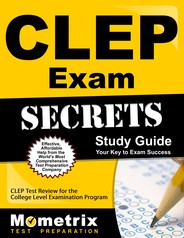What if there was a secret weapon that allowed you to cut a year or more out of the time it takes to get your college degree, while making your college experience more enjoyable, plus saving you potentially thousands of dollars in the process? Would you be interested? Of course you would; who wouldn’t be?
CLEP Test Study Guide with Practice Questions
Well, believe it or not, there really is such a “secret weapon”, and it’s called CLEP, which stands for College Level Examination Program. Of course, most students are somewhat familiar with CLEP, but many do not realize how powerful a program it is, or the massive benefits they can get out of the program. It may not be a literal secret, but given how little most students know about CLEP, it might as well be.
A CLEP test is an exam that tests a person for college level knowledge of a particular subject, and if a person passes the exam, they will be given college credit as if they had actually taken the courses. For example, imagine a young lady who fell in love with English Literature in high school. She excelled at her studies in the field, making A’s, and pursued her own independent reading and study in her spare time.
Chances are good that this young lady has the knowledge she needs to pass a CLEP test in English Literature. By taking and passing the CLEP test, she will save money by not paying for the course or courses, she’ll possibly save time by reducing the amount of credit hours she still needs to earn in order to graduate, and she’ll avoid the boredom of spending hours and hours in a classroom reviewing material she has already mastered.
Free CLEP Practice Tests
- CLEP American Government Practice Test
- CLEP American Literature Practice Test
- CLEP Analyzing and Interpreting Literature Practice Test
- CLEP Biology Practice Test
- CLEP College Composition Practice Test
- CLEP History of the United States I Practice Test
- CLEP History of the United States II Practice Test
- CLEP Human Growth and Development Practice Test
- CLEP Humanities Practice Test
- CLEP Introductory Psychology Practice Test
- CLEP Natural Science Practice Test
- CLEP Principles of Management Practice Test
- CLEP Principles of Microeconomics Practice Test
- CLEP Social Sciences and History Practice Test
Now, multiply that by several classes, which is certainly within reach of many incoming college students, and you can see the potential of CLEP testing. It’s not at all uncommon for someone to earn a year’s worth of college credits this way. At some private colleges, that would mean a saving of over $40,000. Now, it’s true that not all colleges accept CLEP credits, while some colleges accept only a few, but most colleges and universities have a generous CLEP policy.
It’s a shame that more students don’t take advantage of this wonderful program. Many of them might think that they’re not prepared to pass a CLEP exam in any subject, let alone several. While it’s true that not everyone is going to be able to test out of a year’s worth of classes via CLEP, most college students could easily obtain several credits this way. Here’s hoping that more students begin taking advantage of this secret weapon.
More Free CLEP Practice Questions
- CLEP American Government Practice Test Questions
- CLEP American Literature Practice Test Questions
- CLEP Analyzing Interpreting Literature Practice Test Questions
- CLEP Biology Practice Test Questions
- CLEP Introductory Business Law Practice Test Questions
- CLEP College Algebra Practice Test Questions
- CLEP College Composition Practice Test Questions
- CLEP College Math Practice Test Questions
- CLEP English Composition Practice Test Questions
- CLEP English Literature Practice Test Questions
- CLEP Human Growth and Development Practice Test Questions
- CLEP Humanities Practice Test Questions
- CLEP Information Systems Practice Test Questions
- CLEP Introductory Psychology Practice Test Questions
- CLEP Principles of Management Practice Test Questions
- CLEP Principles of Microeconomics Practice Test Questions
- CLEP Natural Science Practice Test Questions
- CLEP Social Science Practice Test Questions
- CLEP US History I Practice Test Questions
- CLEP US History II Practice Test Questions
- CLEP Western Civilization I Practice Test Questions
- CLEP Western Civilization II Practice Test Questions
Additional Practice
Chemistry Exam
Physics Exam
Biology Exam
Mathematics Exam
- Basic Algebra
- Intermediate Algebra
- Advanced Algebra
- Averages and Rounding
- Estimation and Sequences
- Exponents
- Fractions and Square Roots
Freshman College Composition Exam
- Commas
- Basic Grammar
- Intermediate Grammar
- Advanced Grammar
- Nouns
- Verbs
- Sentence Correction
- Sentence Flow
- Word Usage Test 1
- Word Usage Test 2
- Word Usage Test 3
- Writing Section 1
- Writing Section 2




 Get Your Study Guide
Get Your Study Guide Get Your Flashcards
Get Your Flashcards